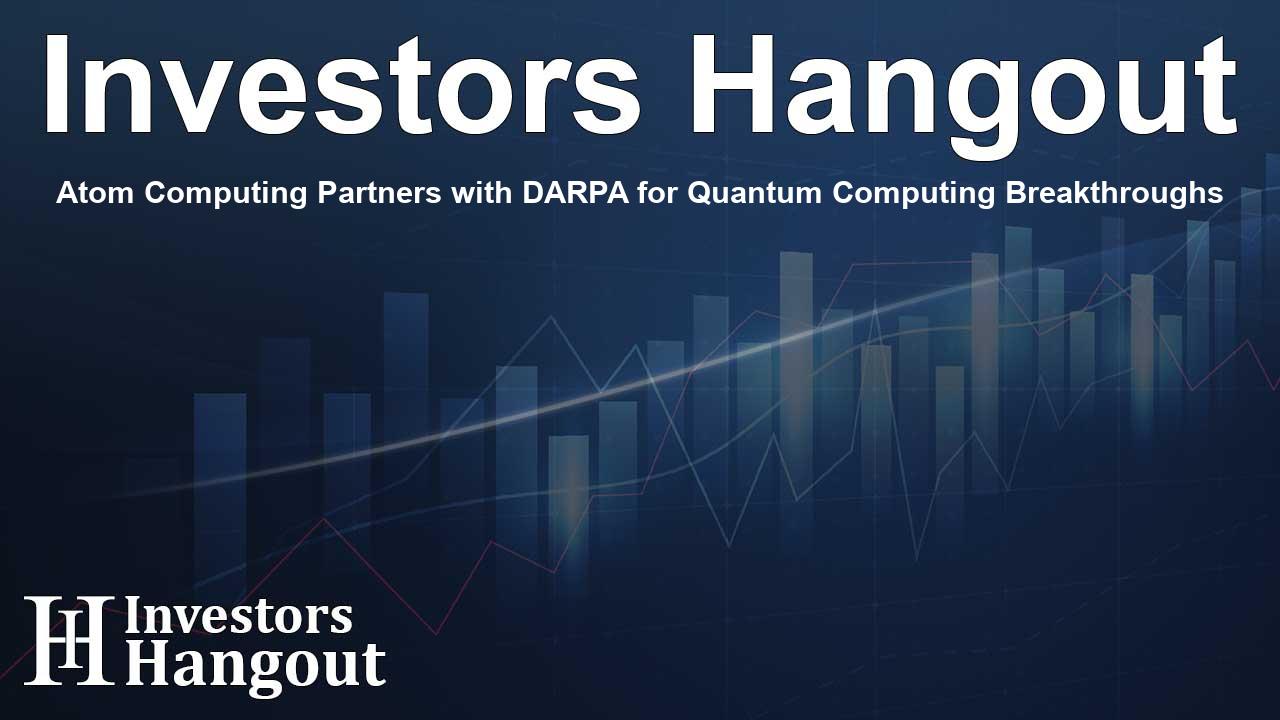Atom Computing Partners with DARPA for Quantum Computing Breakthroughs

Atom Computing Teams Up with DARPA to Revolutionize Quantum Computing
Atom Computing is making significant strides in the realm of quantum computing, having been selected by DARPA to investigate the potential of their innovative neutral atom technology for scalable quantum computing. This collaboration represents a major leap towards developing practical, utility-scale quantum computers that could redefine the technological landscape. The initiative is part of DARPA’s Quantum Benchmarking Initiative (QBI), which seeks to expedite the creation of industrially viable quantum computers far more rapidly than traditional methods would suggest.
Understanding the Quantum Benchmarking Initiative
The Quantum Benchmarking Initiative is an extension of existing programs aimed at exploring underappreciated systems in the quest for effective quantum computing solutions. Through the QBI program, Atom Computing will lay the groundwork for a utility-scale quantum computer, emphasizing feasibility and rapid execution. This phase capitalizes on conceptual designs that can be approached with actionable plans within a short timeframe, ultimately aspiring to bring transformative capabilities to various sectors.
Merging Innovations: Microsoft Joins Forces
As part of this notable collaboration, Atom Computing will also benefit from algorithmic support and error correction codes provided by Microsoft. This partnership highlights the collective effort to harness diverse expertise in the quantum field, pushing the envelope for what’s possible with quantum technology. The unified goal is to develop systems that can handle complex computational tasks, paving the way for businesses and researchers to unlock unprecedented innovations.
Key Advantages of Atom’s Technology
Atom Computing’s approach leverages several critical capabilities to push the boundaries of quantum computing. By utilizing arrays of optically trapped neutral atoms, their systems boast features such as high-fidelity gate operations and extensive qubit connectivity. These advancements enable the execution of quantum tasks that were previously thought unattainable.
Physical Qubits and Their Role
The company has achieved remarkable milestones, notably developing systems incorporating over 1,000 physical qubits. This capacity not only enhances computational power but also allows for long coherence times essential for stable operation. Furthermore, Atom Computing has successfully demonstrated mid-circuit measurements with qubit reset mechanisms, which are crucial for efficient quantum operations, thus solidifying their standing as leaders in quantum advancements.
Industry Impacts and Future Directions
The potential repercussions of Atom Computing’s innovations extend beyond theoretical applications. They are positioned to actively transform industries by providing computational tools that can resolve intricate problems more efficiently than ever before. As quantum technology progressively matures, Atom Computing aims to integrate its systems into existing infrastructures, fostering wider adoption and exploration of quantum methods in real-world applications.
Looking Ahead
Reflecting on the significance of this collaboration, Dr. Ben Bloom, Founder and CEO of Atom Computing, stated, "Pushing the state-of-the-art of quantum computing to utility scale is an exciting challenge, and it is an incredible honor to be selected to participate in DARPA's QBI program. We are confident that Atom Computing's technology and roadmap are on track with DARPA's timeline for achieving utility-scale quantum computing." This sentiment embodies the optimism and ambition driving the quantum computing landscape forward.
About Atom Computing
Atom Computing specializes in creating large-scale quantum computers to facilitate remarkable computational breakthroughs for diverse industries. With a focus on utilizing scalable neutral atom technology, they have developed systems featuring over 1,000 qubits equipped with advanced capabilities aimed at establishing fault-tolerant quantum computing. Their on-premises systems empower customers to tackle increasingly complex applications, contributing to the expansion of the quantum computing ecosystem.
Frequently Asked Questions
What is Atom Computing's role in quantum computing?
Atom Computing is focused on developing large-scale quantum computers using neutral atoms to enable significant advancements in computational capabilities.
What is the Quantum Benchmarking Initiative?
The Quantum Benchmarking Initiative is a DARPA program that seeks to accelerate the development of practical quantum computers that can be used in real-world applications.
How does Atom Computing collaborate with Microsoft?
Atom Computing collaborates with Microsoft by receiving algorithmic support and error correction codes, enhancing their quantum systems' capabilities.
What are some features of Atom's quantum systems?
Key features include high-fidelity gate operations, extensive qubit connectivity, and systems with over 1,000 physical qubits.
What impact will utility-scale quantum computing have?
Utility-scale quantum computing is expected to transform various industries by providing powerful tools for addressing complex computational challenges.
About The Author
Contact Logan Wright privately here. Or send an email with ATTN: Logan Wright as the subject to contact@investorshangout.com.
About Investors Hangout
Investors Hangout is a leading online stock forum for financial discussion and learning, offering a wide range of free tools and resources. It draws in traders of all levels, who exchange market knowledge, investigate trading tactics, and keep an eye on industry developments in real time. Featuring financial articles, stock message boards, quotes, charts, company profiles, and live news updates. Through cooperative learning and a wealth of informational resources, it helps users from novices creating their first portfolios to experts honing their techniques. Join Investors Hangout today: https://investorshangout.com/
The content of this article is based on factual, publicly available information and does not represent legal, financial, or investment advice. Investors Hangout does not offer financial advice, and the author is not a licensed financial advisor. Consult a qualified advisor before making any financial or investment decisions based on this article. This article should not be considered advice to purchase, sell, or hold any securities or other investments. If any of the material provided here is inaccurate, please contact us for corrections.
